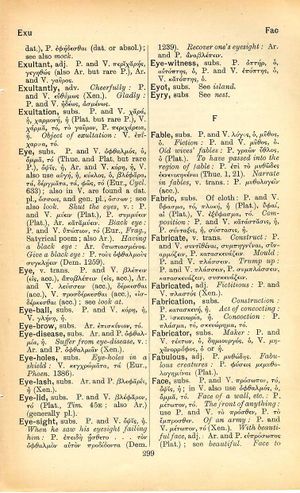fable: Difference between revisions
From LSJ
ἀγαπήσεις τὸν πλησίον σου ὡς σεαυτόν → love your neighbor as yourself, thou shalt love thy neighbour as thyself, love thy neighbour as thyself
(CSV4) |
m (Woodhouse1 replacement) |
||
| Line 1: | Line 1: | ||
{{Woodhouse1 | {{Woodhouse1 | ||
|Text=[[File:woodhouse_299.jpg|thumb|link={{filepath:woodhouse_299.jpg}}]] | |Text=[[File:woodhouse_299.jpg|thumb|link={{filepath:woodhouse_299.jpg}}]] | ||
P. and V. [[λόγος]], ὁ, [[μῦθος]], ὁ. | ===substantive=== | ||
[[prose|P.]] and [[verse|V.]] [[λόγος]], ὁ, [[μῦθος]], ὁ. | |||
[[fiction]]: [[prose|P.]] and [[verse|V.]] [[μῦθος]], ὁ. | |||
[[old wives' fables]]: [[prose|P.]] [[γραῶν ὕθλος]], ὁ ([[Plato]]). | |||
[[to have passed into the region of fable]]: [[prose|P.]] [[ἐπὶ τὸ μυθῶδες ἐκνενικηκέναι]] ([[Thucydides|Thuc.]] 1, 21). | |||
[[narrate in fabtes]], '''verb transitive''': [[prose|P.]] [[μυθολογεῖν]] (acc.). | |||
}} | }} | ||
Revision as of 08:54, 20 May 2020
English > Greek (Woodhouse)
substantive
old wives' fables: P. γραῶν ὕθλος, ὁ (Plato).
to have passed into the region of fable: P. ἐπὶ τὸ μυθῶδες ἐκνενικηκέναι (Thuc. 1, 21).
narrate in fabtes, verb transitive: P. μυθολογεῖν (acc.).

